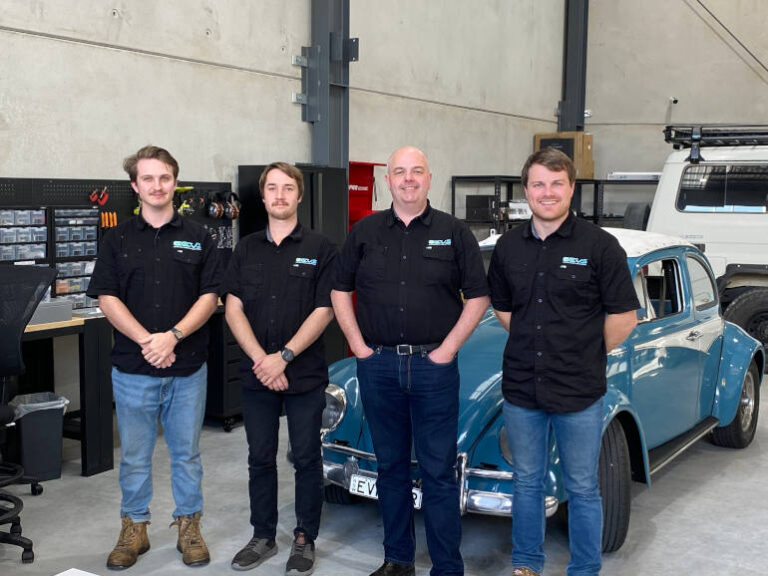New electric vehicles aren’t the only option for fleets or car enthusiasts that want to reduce their CO2 emissions. Electric vehicle conversions are becoming a popular option as the prices fall for batteries and other components. It’s also creating employment opportunities for local manufacturing. I visited Australian Electric Vehicle Specialists in Newcastle to learn more about this emerging local industry and spoke with Edwin Higginson, Director at Australian EVS.
Marc: Thanks for inviting Fleet EV News to visit, this is an impressive space, when did you move in and how many people do you have working here now?
Edwin: Yes, it’s been fantastic. We moved in here during January after getting involved with Newcastle University. They’ve got a great team running the EV racing team, and we now sponsor them. We’ve been lucky to get quite a few of the engineering team to come on board. There’s seven working here now. A couple who have graduated and are working full time, and others who work on their days off. Rather than having to work at Bunnings or McDonald’s, they come and work here, bringing the latest expertise to the floor, which has been great.
Marc: Are they electrical engineers, mechanical engineers? What’s the mix?
Edwin: Mechanical and mechatronics are the main ones. They’re great at bringing in expertise, and I can share some of my business and corporate knowledge, especially around consulting for big fleets. They’re obviously a lot better at Excel and data analysis than I am, and the passion they bring to doing the conversions is invaluable.
Marc: This is a big step since you first started with the conversion on the VW Beetle, how long have you had the Beetle, and how long has the business been going?
Edwin: We started the business coming out of COVID when my mate and I were looking for something new. We saw the industry shifting to EVs and wanted to get involved. Electric vehicle conversions have really taken off in Europe and America. For me, it’s all about performance and improving how something drives. I’m a petrol head, and EVs bring a whole new level of performance, especially for something like the Beetle.
Marc: You’ve been traveling around to the NRMA EV drive days, displaying the Beetle and talking about conversions, what level of interest is there in the conversion market? Are people interested in converting their older cars? Is it just for hobbyists, or is there a real car culture for electric vehicle conversions?
Edwin: People with classic cars have always looked for ways to improve performance, handling, and power. Doing an EV conversion is just an alternative to putting in a high-performance petrol engine. It’s a similar cost. For instance, our VW Beetle went from 40 horsepower to 120. I like to explain it as having an old Federation house that looks nice but with a new kitchen and bathroom inside. We’re at an early stage in the industry, but in three to five years, we expect to be doing a lot of conversions to the existing 21 million petrol and diesel cars on the road. We want to help people get to zero emissions using their existing fleet, not necessarily buying a whole new EV fleet.
Marc: You’ve got some more conversions coming up. What’s next in the pipeline?
Edwin: We’ve got equipment for two cars we’re currently converting. One is an old Citroen 2CV, which looks pretty cool, and the other is a 1955 MG. We’re also in talks about an old Lincoln car and helping someone who bought a kit for an old Land Cruiser but didn’t have everything they needed. Our kits come with everything you need to basically turn the key and drive away.
Marc: Walking around the factory, I see electric motors and drive units from external suppliers, but there’s a lot of in-house development too. Can you talk about that?
Edwin: All our components for electric vehicle conversion kits are brand new. We buy mechanical parts from the US and high-voltage connectors, batteries from China using the latest lithium ferrous phosphate technology. In our workshop, or R&D facility, we develop and fine-tune these kits, then move to mass-produce them for distribution to workshops around the country.
Marc: I’m intrigued about the gear shifter in the Beetle, do you still keep the gearbox in older cars?
Edwin: Yes, you have options. You can do a direct drive system straight to the rear axle, which adds cost and complexity, or the second option is what we call a ‘non-destructive’ conversion. We bolt the electric motor straight into the gearbox, allowing you to use it as you would today but with more power. This way, you can always revert to petrol if you want in the future.






